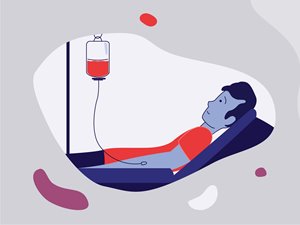Clinical trials offer an opportunity for a patient to receive an investigational treatment, while also supporting progress in scientific research that may eventually help those who have the disease. But if you are considering a clinical trial for yourself, your child, or a family member, this may be uncharted waters for you. Here is a glimpse into what to expect when entering a clinical trial, and what the long-term follow-up requirements may entail for participants.
Informed Consent
Clinical trials determine how safe and effective a treatment is at relieving symptoms or potentially curing a condition. Patients taking part in a clinical trial may get helpful treatment, but it's also possible they may not receive any benefits, or be exposed to unknown risks.
 This is why the informed consent process is so important. Informed means you are made aware of possible risks and benefits, and consent means you have then given permission to proceed with the treatment. Researchers are required to provide an informed consent document to patients, which explains a variety of details including the study design, expected length of time for participants to receive the treatment, predicted risks, possible benefits, rights of the patients who are subjects in the study, and more. Patients can review the document, ask questions, and then ultimately decide whether to participate. Providing informed consent means that the patient or guardian agrees to participate in the trial after receiving sufficient information. The U.S. Food & Drug Administration and the Courageous Parent Network have both created guides on informed consent and the elements the document may include.
This is why the informed consent process is so important. Informed means you are made aware of possible risks and benefits, and consent means you have then given permission to proceed with the treatment. Researchers are required to provide an informed consent document to patients, which explains a variety of details including the study design, expected length of time for participants to receive the treatment, predicted risks, possible benefits, rights of the patients who are subjects in the study, and more. Patients can review the document, ask questions, and then ultimately decide whether to participate. Providing informed consent means that the patient or guardian agrees to participate in the trial after receiving sufficient information. The U.S. Food & Drug Administration and the Courageous Parent Network have both created guides on informed consent and the elements the document may include.
Physical Preparation for a Clinical Trial
There is usually a clinical screening visit to determine if a patient meets the criteria to be included in the trial. Then, depending on the treatment approach, a patient may need to undergo laboratory tests on blood, urine and other bodily fluids and tissues. These tests can help researchers better understand the patient’s baseline health.
 Patients also may need to undergo additional treatments before receiving the new treatment being studied to help prepare the body for a positive outcome. For example, for CAR T-cell therapy to be successful, patients require conditioning (or lymphodepleting) therapy before CAR T-cells are administered. This is chemotherapy that creates space for CAR T-cells to expand and increase in numbers within the body, so that there are enough to destroy tumor cells. Patients need to consider the potential risks that come with any necessary additional procedures, in addition to potential risks associated with the investigational therapy.
Patients also may need to undergo additional treatments before receiving the new treatment being studied to help prepare the body for a positive outcome. For example, for CAR T-cell therapy to be successful, patients require conditioning (or lymphodepleting) therapy before CAR T-cells are administered. This is chemotherapy that creates space for CAR T-cells to expand and increase in numbers within the body, so that there are enough to destroy tumor cells. Patients need to consider the potential risks that come with any necessary additional procedures, in addition to potential risks associated with the investigational therapy.
Lifestyle Preparation for a Clinical Trial
It is important for a patient and their caregivers to consider the commitment and significant lifestyle changes that may take place before and during trial participation. It can be emotionally—and logistically—complicated for a patient and their family. Although the investigational treatment may be potentially lifesaving, it may be necessary to travel to another state (or even country) and require the patient and caregiver to be away from their support system, home, and jobs for an extended amount of time, possibly months. Due to the complexity of this decision-making process it can be helpful to hear from other people’s experiences in this clinical trials decision making video series, along with these questions to consider when evaluating a trial option, created by the Courageous Parent Network.
 Timing and cost of a clinical trial are also important things to consider. Participating in a clinical trial provides an investigational drug at no cost, but typically at least a portion of routine patient care costs are charged to the patient's health insurance. But, remember that medical information is between the patient, their healthcare team and the trial’s research team. You are not legally obligated to tell an employer about a clinical trial and should consider what is best for your situation. Also, non-treatment costs like travel expenses and lodging may not be covered by the trial sponsor.
Timing and cost of a clinical trial are also important things to consider. Participating in a clinical trial provides an investigational drug at no cost, but typically at least a portion of routine patient care costs are charged to the patient's health insurance. But, remember that medical information is between the patient, their healthcare team and the trial’s research team. You are not legally obligated to tell an employer about a clinical trial and should consider what is best for your situation. Also, non-treatment costs like travel expenses and lodging may not be covered by the trial sponsor.
Ask about options that may exist to help limit this financial burden such as:
- Miracle Flights, an organization that provides free flights for patients who need life-changing medical care not found locally.
- The Assistance Fund, a charitable patient assistance organization that helps those facing high medical out-of-pocket costs by providing financial assistance you can apply for.
- PALS SkyHope arranges free flights for medical patients requiring medical diagnosis, treatment or follow-up who cannot afford or are unable to fly commercially.
Follow-Up Requirements
The role of a patient in the clinical trial process goes beyond treatment completion. It is the patient’s responsibility to comply with the long-term follow-up of a trial, which is required by FDA guidelines. Lack of attendance at follow-up appointments can affect study data since there may be few participants in trials for certain disorders. Follow-up may require in-person appointments that vary in frequency and location, or completion of mailed packets with response forms and guidelines. The need for long-term data collection can last up to 15 years—another reason for patients to consider all outcomes and responsibilities that come with committing to a clinical trial. Insufficient follow-up and study data may affect FDA approval of a new drug and thereby limit access to the treatment by patients who did not participate in the clinical trial.
Expectations
Although you may be feeling positive and hopeful about the potential of a clinical trial, it is necessary to stay realistic as well. Therapies being investigated in clinical trials are not a guaranteed cure—they’re a step in research to progress toward treating diseases. There is always a chance that the investigational treatment may not work, or that redosing may not be an option based on the type of treatment administered. In addition, participating in a clinical trial for a new investigational treatment may prevent future participation in other trials. When weighing risks and benefits, remember that a therapy provided in a clinical trial isn’t an approved treatment, but participating in a trial has many potential benefits compared to not receiving any form of intervention for a potentially fatal disease.
Visit the Clinical Trials Guided Pathway, created by the Courageous Parents Network, to continue learning more about the clinical trials process through this step-by-step curriculum for parents.